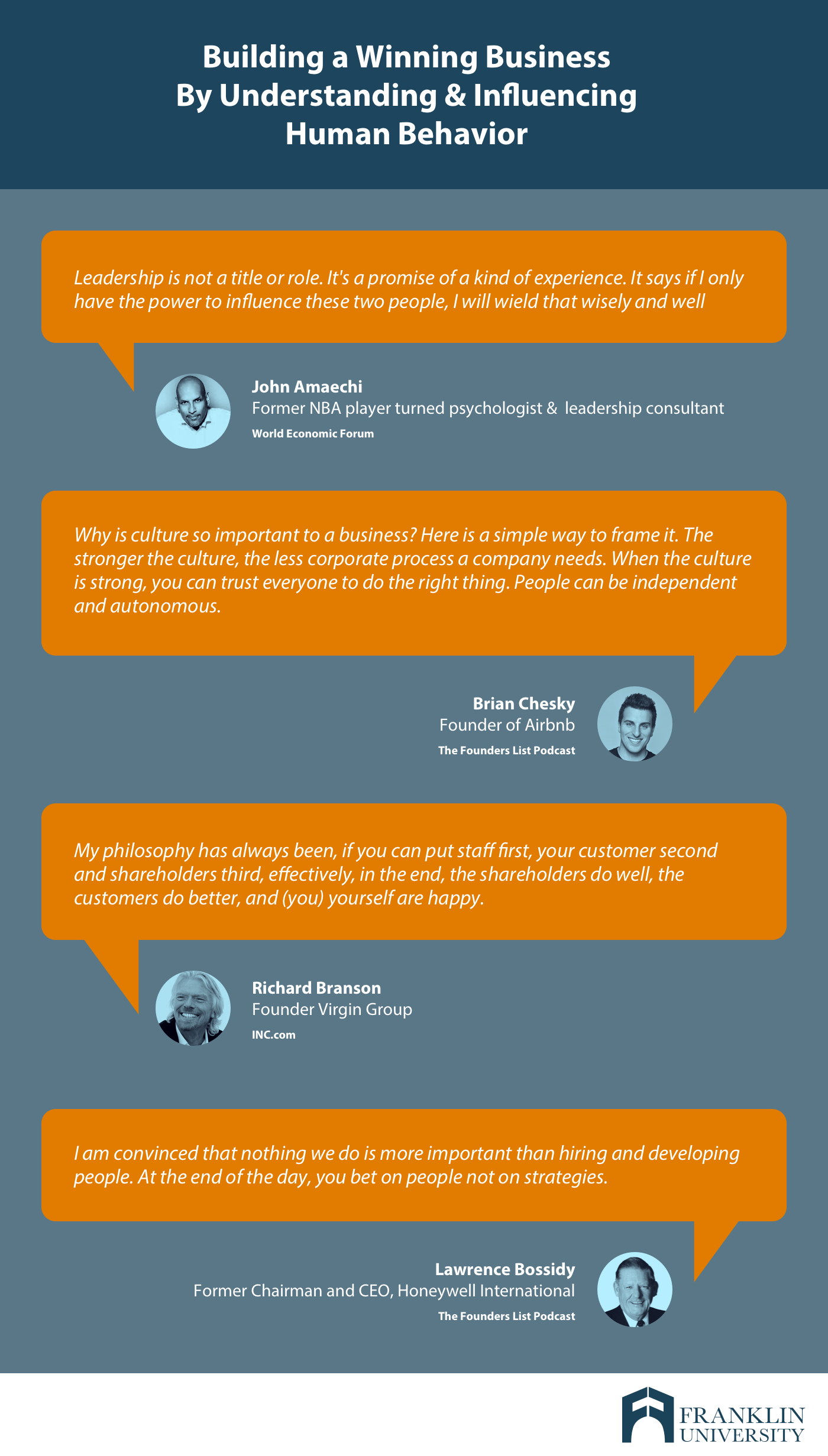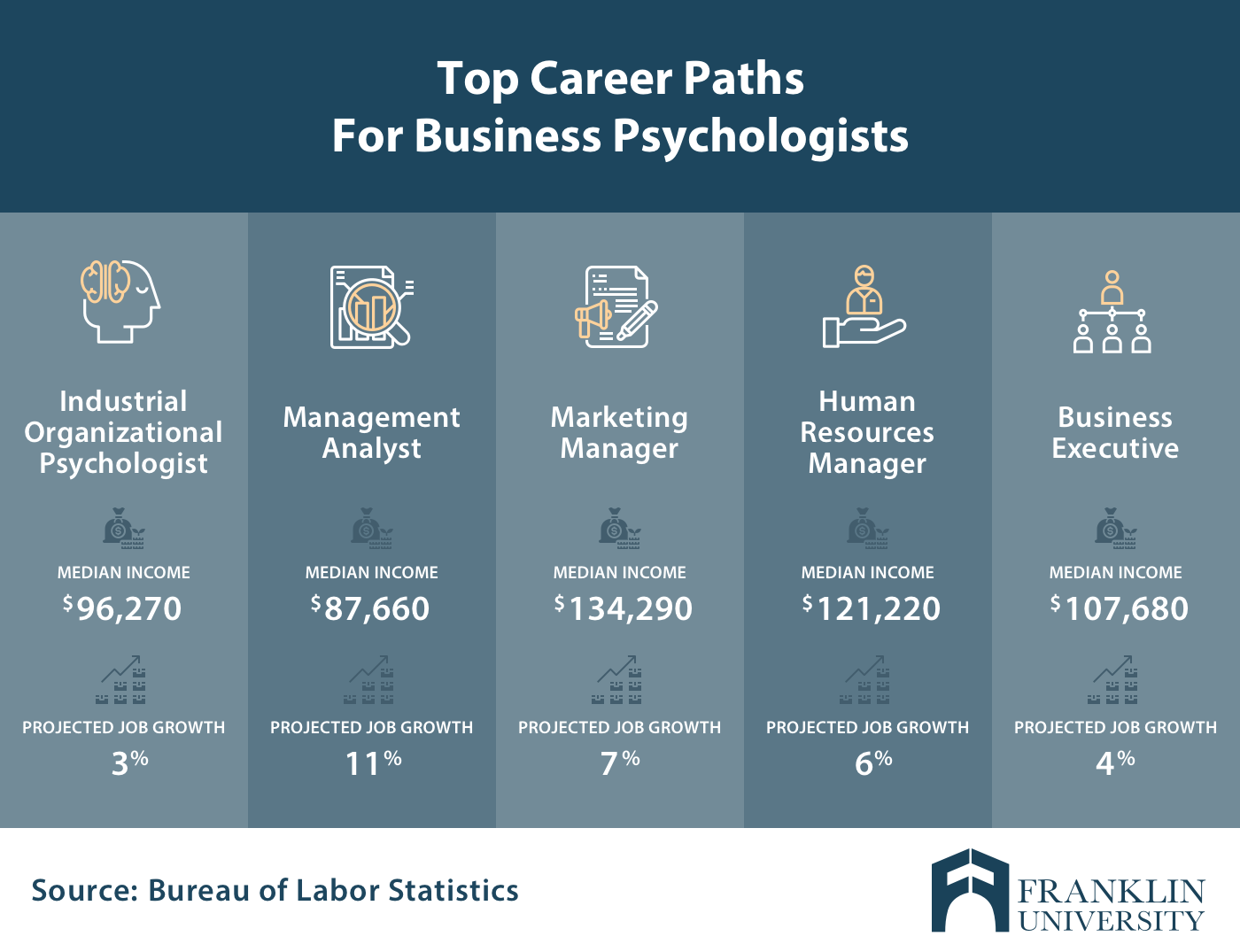Request Information
We're Sorry
There was an unexpected error with the form (your web browser was unable to retrieve some required data from our servers). This kind of error may occur if you have temporarily lost your internet connection. If you're able to verify that your internet connection is stable and the error persists, the Franklin University Help Desk is available to assist you at helpdesk@franklin.edu, 614.947.6682 (local), or 1.866.435.7006 (toll free).
Just a moment while we process your submission.

What Is Business Psychology? A Deep Dive Into This Thriving Field
Business psychology combines advanced business practices with the study of human behavior to improve the productivity, efficiency and culture of workplaces.
At its core, every business is a human enterprise. Business success relies on positive human interactions, strong relationships and understanding individual motivations. From creating an internal culture and motivating employees to reaching and converting customers, understanding psychological principles can make or break a business.
It sounds straightforward, but what does this intersectional field look like in practice? Why is there a need for business psychology experts in everyday workplaces? We’re here to help you better understand the field of business psychology and the career opportunities it offers.
Defining Business Psychology As A Field
Modern day business psychology finds its roots in industrial psychology, which originated in the United States in the early 1900s. Its practical application took off in the wake of World War I and World War II.
Today, the science of psychology is helping to redefine what makes a successful workplace. Business psychology combines multi-disciplinary business study with the latest psychological and neuroscience research. Business psychology degrees explore traditional business and psychology disciplines in non-traditional ways, focusing on the qualitative and human aspects of marketing, economics, finance, management, and human resources.
How Is Business Psychology Used In Organizations?
Human relationships are core to the success of any business. From employee to consumer interactions, no one understands this crucial aspect of business better than leaders of top companies who use business psychology to their competitive advantage.

Business psychology can be used in every facet of business. Let’s look at the influential ways business psychology is used in organizations in every industry.
- Marketing: Marketing professionals apply psychological principles in new product or service marketing. Business psychology helps them understand consumer behavior, develop motivational messaging and create compelling marketing campaigns to convert customers.
- Talent Recruiting & Management: Business psychology helps human resource professionals differentiate job applicants using behavioral science methods. It also teaches them motivational coaching techniques to improve employee performance.
- Executive Leadership: Business leaders can use psychology tools to assess the business intelligence of an organization and create processes that stimulate innovation and productivity.
- Change Management: Change can be a difficult process at any organization. Whether moving to a remote workforce or addressing ethical challenges, understanding human behavior can help managers anticipate and mitigate workforce issues.
- Organizational Culture: Defining a corporate culture helps organizations develop long-term strategies, hire the right people and grow their brand. Understanding the value of neuroscience tools in the workplace can build a long-lasting and powerful corporate culture.
What matters most when choosing a master’s program? Compare features, benefits and cost to find the right school for you.
The Role of Business Psychologists: What They Do
Business psychologists have a variety of responsibilities within their organization. Due to their influential role in employee management, emotional intelligence and dedication are leading traits in this career choice.
Day-to-day responsibilities may vary by role or department, however, all business psychologists need to be equipped to complete the following tasks:
- Increase business efficiency and employee productivity.
- Establish employee training and development programs.
- Provide motivational leadership and coaching for employees.
- Perform employee evaluations.
- Improve organizational structure to meet business goals.
- Enhance workplace safety and employee wellbeing.
5 Career Paths for Business Psychology Professionals

There are many different career paths for individuals with a business psychology degree. Business psychologists can be found in organizations large and small across the private, public and nonprofit sectors.
Getting a master’s degree in business psychology can help professionals advance to management and executive leadership positions, which offer higher pay, better job stability and increased employment opportunities.
Let’s look at some of the popular career paths for professionals with a master’s degree in business psychology.
Industrial-Organizational Psychologist
The most direct translation of a business psychology degree is to pursue a career as an industrial or organizational psychologist. These professionals apply psychological principles and research methods to enhance the overall work environment, including: employee performance, interdepartmental communication, professional satisfaction and workplace safety.
- Median Income: $96,270
- Projected Job Growth: 3%
Management Analyst
Management analysts, also called management consultants, recommend ways to improve organizational efficiency. A degree in business psychology provides both the business process knowledge and qualitative analysis skills to take human behavior into account when making suggestions for improvement.
- Median Income: $87,660
- Projected Job Growth: 11%
Marketing Manager
Marketing managers plan and direct promotional programs, such as determining the demand for products and services, identifying potential customers and developing pricing strategies. Getting a degree in business psychology prepares these professionals to research, monitor and evaluate customer behavior to optimize marketing initiatives.
- Median Income: $134,290
- Projected Job Growth: 7%
Human Resources Manager
Human resources managers are responsible for recruiting, developing and retaining top talent. These professionals consult with top executives on strategic planning, serving as a link between an organization’s management and its employees. A business psychology degree is a natural fit for this role that requires empathy and motivational skills.
- Median Income: $121,220
- Projected Job Growth: 6%
Top Executive
Top executives are responsible for developing and implementing business strategies. Many prospective executives lean toward MBA degrees when considering advanced education. However, in today’s highly competitive markets, expertise in human-centered leadership can be a differentiating factor. A business psychology master’s degree can give you an edge by giving you a well-rounded business education from a qualitative, people-first perspective.
- Median Income: $107,680
- Projected Job Growth: 4%
Prepare For A Career In Business Psychology With a Master’s Degree
Advancing your career in business can greatly benefit from understanding human behavior and motivation. Earning a master’s degree in business psychology is an ideal way to make yourself an empathetic and holistic leader.
Franklin University offers an online M.S. in Business Psychology degree that can be completed in as few as 14 months. At Franklin, experienced business professionals teach you to combine business strategy with the latest psychological research to empower business growth.
See how Franklin University’s M.S. in Business Psychology can prepare you to apply new insights into human behavior to solve business challenges and advance your career.





